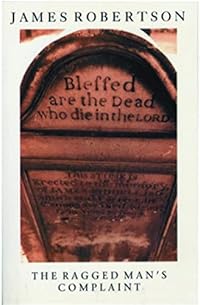The Ragged Man’s Complaint by James Robertson
Posted in Scottish Literature, Scottish Fiction, James Robertson, Reading Reviewed at 12:00 on 25 February 2017
B&W Publishing, 1993, 158 p.

This is Robertson’s second collection of short stories, after Close.
Giraffe is told from the viewpoint of a worker in a Safari Park and gives a picture of all the dodgy practices that go on there.
In Plagues a man who works in a bookshop sees frogs everywhere and is worried that’s only the beginning.
Screen Lives displays a woman and a man developing their relationship by acting out lines from the film Notorious.
In The Jonah one of two men hitch-hiking in a backwater reflects on how to turn his life around.
The Claw is the withered appendage of the HIV positive narrator’s grandfather, “caught between hope and history,” in a care home. A monitor of his future.
Squibs contains four vignettes a couple of which approach the style of Iain Crichton Smith’s Munro stories.
Bastards relates an encounter in a pub, where a man mistakes another for “the cunt my wife ran off wi’.”
Facing It is a vignette even shorter than those in Squibs wherein a man sees his innards cascade into the toilet bowl and realises he can no longer ignore his medical problem.
The unarguably apocalyptic The End is Nigh, told in almost biblical cadences, has a Science-Fictional feel as a prophet extends his sermon while wandering the countryside.
There are reflections on writing, relative privilege and Scotland in The Mountain, where for a few months in the winter following his grandfather’s death a man occupies the ancestral croft.
What Love Is examines the distance between married couple Dan and Joan, between men’s lives and women’s. “Dan isn’t frightened of other lives. He imagines them all the time. The only life he is frightened of is his own.”
Portugal 5, Scotland 0 (the comma is Robertson’s – or his publisher’s.) During the game concerned two men in a pub take to discussing Hugh MacDiarmid, poetry and Scotland’s cultural reawakening, turning back only after the game is finished, since the football has begun not to matter so much.
In Tilt Alan’s friend Mike tells him the only question in the world worth asking is, “What’s it about?” (Note the absence of “all”.) Alan’s increasingly shiftless feeling comes to a head one day after an encounter with a recalcitrant pinball machine and Mike’s sister, Mona.
Surprise, Surprise. A man accompanies three girls to a party and while there finds his evening is described in a book he picks from a shelf.
In the absence of the real thing, the Tories having won a General Election again (the book’s publication date suggests the 1992 one) Robert occasionally retreats into The Republic of the Mind. “I just think what a waste of time it is, having to wait to be a normal country, having to waste all this energy identifying ourselves. So I bugger off anyway. To the Scottish Republic of the mind.” On an epiphany he thinks, “You had to come upon it, or it came upon you.” He also realises, “how nobody ever assumed their neighbour was a Tory in a public house in Scotland,” and “We’re a nation of philosophers … at the end of the day. A nation of fucking philosophers.” That expletive is a brilliant piece of emphasis by Robertson. It demonstrates both the glory and the despair of the thought it qualifies.
Someone, perhaps homeless, perhaps not, is Pretending to Sleep. For all the ones who cannot do it for themselves. It is a strange existence. “Funny how in the cells they come to check if you’re not dead. Out here, out in the open, nobody checks” but, “Just by lying there, pretending to sleep, you get under their skin …. deep into them.” It’s a horror story. But not for the pretender.
Pedant’s corner:- staunch (stanch,)
